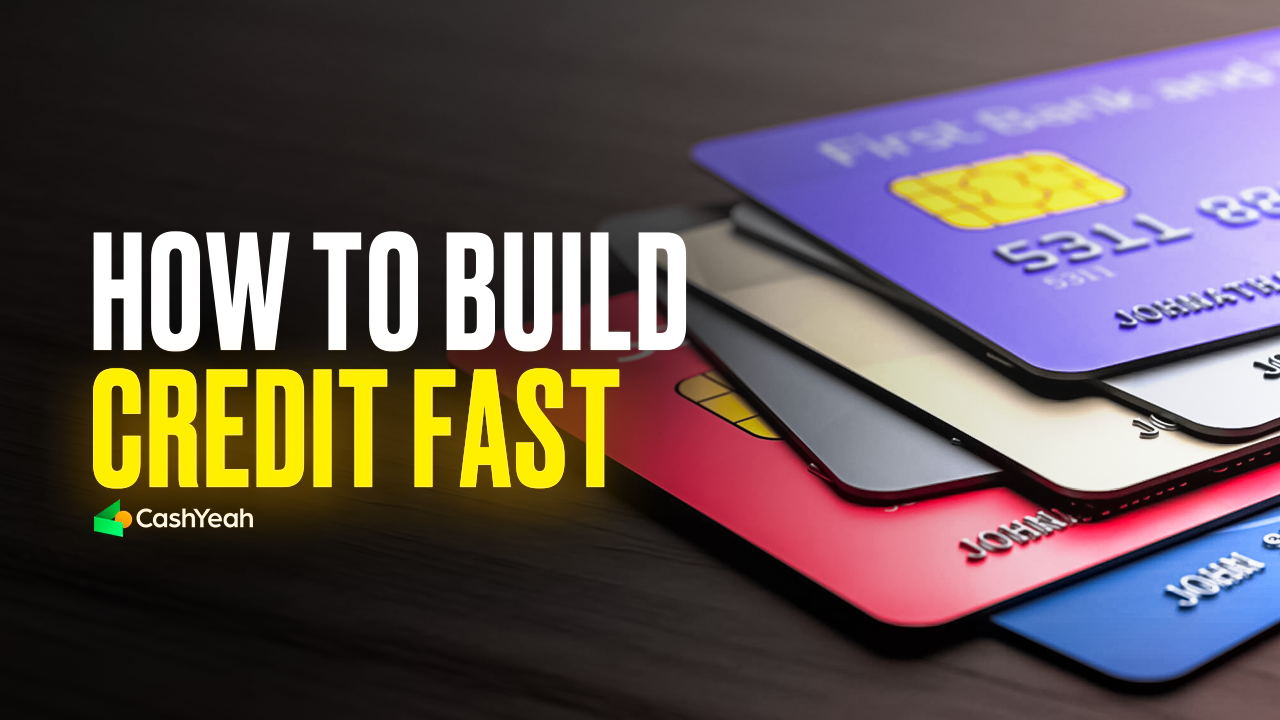Learning how to build credit fast is crucial for anyone aiming to unlock better financial opportunities, whether you’re just starting out or looking to repair poor credit. A higher credit score opens the door to lower interest rates, better loan terms, and higher credit limits. Here’s a detailed guide on how to build credit quickly and effectively.
What is Credit and How Does it Work?
Credit is the ability to borrow money or obtain something of value with the agreement to repay the lender at a later date, typically with interest. It’s a crucial aspect of personal finance, and understanding how it works is essential for building a strong credit profile. In general, credit is based on trust—lenders trust that borrowers will repay their debts based on their past credit history.
This history is documented in credit reports, which in the United States are compiled by the three major credit bureaus: Experian, Equifax, and TransUnion. These reports contain detailed information about your credit accounts, payment history, and overall credit behavior. Credit scores, derived from these reports, evaluate the risk you pose as a borrower. A higher credit score indicates lower risk, making you more attractive to lenders, while a lower score suggests higher risk.
1. Understand Your Credit Report
The first step in learning how to build credit is understanding your credit report. One of the most important money saving tips, Reviewing your credit reports for accuracy is essential. If you manage to dispute credit report errors, it can lead to an immediate boost in your credit score. Monitoring your credit reports regularly also helps you track your progress and spot potential identity theft or other issues early on.
How To Check Your Credit Report for Free
Checking your credit report for free is a straightforward process that can help you stay on top of your credit health. You are entitled to a free annual credit report from each of the three major credit bureaus—Equifax, Experian, and TransUnion—through AnnualCreditReport.com. This allows you to review your credit reports for any inaccuracies or signs of identity theft.
Additionally, many financial institutions and credit card companies offer free credit monitoring services that provide regular updates on your credit status. While some services are paid, ranging from $0 to around $140 per year, they can offer more frequent monitoring and additional features. Remember, your FICO score is particularly valuable as it is used in 90% of lending decisions. You can access your FICO score for free through Experian or by signing up on the MyFICO.com website.
2. Make On-Time Payments
When it comes to building a high credit score, on-time payments are crucial. Your payment history is the most significant factor affecting your FICO score, accounting for 35% of it. If you’re wandering how to budget, making on-time payments is one of the fastest ways to improve your credit. Paying bills on time, including utilities and other recurring expenses, positively influences credit reporting and helps maintain a good credit score. To ensure timely payments, set up automatic payments or reminders for your bills. Missing payments can severely damage your credit score, so prioritize keeping your payment history positive.
3. Keep Your Credit Utilization Low
Credit utilization, or the percentage of your available credit that you’re using, plays a significant role in your credit score. Aim to keep your overall credit utilization below 30% to build credit fast. For example, if your credit limits total $10,000, try to keep your credit card balances under $3,000. Reducing your credit utilization ratio is one of the quickest ways to improve your credit score. If possible, consider requesting a credit limit increase or opening a new credit card to boost your available credit.
4. Become an Authorized User
One of the most effective ways to build credit quickly is to become an authorized user on someone else’s credit card. This strategy allows you to benefit from the primary cardholder’s positive credit history without the responsibility of managing the bank account. By becoming an authorized user, you can see a significant increase in your credit score, especially if the credit card account is older and has a high credit limit. However, it’s essential to choose someone with a strong credit history, a secured card, good credit habits, and a good payment record.
5. Open a Secured Credit Card
A secured credit card is an excellent tool for building credit, especially if you’re starting with no credit history or trying to rebuild poor credit or create an additional income stream. Unlike traditional credit cards, secured credit cards require a cash deposit, which serves as your credit limit. By using your secured credit card responsibly—making small purchases and paying off the balance in full each month—you can quickly build high credit card balance. Over time, this responsible credit activity will be reported to the credit bureaus, helping you improve your credit score.
6. Establishing Credit with No Credit History
Establishing a new credit account from scratch can seem daunting, but it’s entirely possible with the right approach. Start by opening a credit account, such as a credit card or a small loan, to begin building your credit rating. Make sure to make on-time payments consistently, as this is a critical factor in your credit score. Stick to lower credit utilization, ideally below 30%. Credit bureaus will report your payment history and credit utilization, which are key components in calculating your credit scores. Remember, establishing credit takes time and discipline, but with responsible management of your credit accounts, you can build a solid credit history.
7. Diversify Your Credit Mix
Your credit mix, which includes different types of credit accounts like credit cards, auto loans, and mortgages, accounts for 10% of your FICO score. If you only have one type of credit account, consider diversifying your credit mix by taking out a small personal loan or opening a new credit card. However, be cautious about opening too many new credit accounts at once, as this can lower your average account age and potentially hurt your credit score in the short term.
8. Limit Hard Inquiries
Hard inquiries occur when you apply for new credit, and they can temporarily lower your credit score. To build credit fast, it’s essential to limit the number of new credit applications you make. Focus on maintaining your existing credit accounts and only apply for new credit when absolutely necessary. If you’re shopping for a mortgage or auto loan, try to do so within a short time frame—credit scoring models often treat multiple inquiries for the same type of credit as a single inquiry, minimizing the impact on your credit score.
9. Earn Rewards and Save Money with CashYeah
At CashYeah, you can boost your finances and save money by earning rewards for tasks like surveys, watching videos, or playing mobile games. These rewards can be used to pay down credit card balances, save for a credit-builder loan, or contribute to your savings account—all of which can positively impact your credit journey. By utilizing the rewards from CashYeah, you can accelerate your efforts to build credit and improve your financial standing.
10. Consider a Credit-Builder Loan
A credit-builder loan is specifically designed to help individuals build credit. When you take out a credit-builder loan, the lender deposits the loan amount into a savings account instead of giving it to you upfront. You then make fixed monthly payments, and once the loan is fully paid off, the funds are released to you. The lender reports your payment history to the credit bureaus, which helps you establish a positive credit history. Credit-building tools like these can be particularly beneficial for those who are new to credit or looking to rebuild poor credit.
Common Credit Mistakes to Avoid
Avoiding common credit mistakes is essential for maintaining a healthy credit profile. Here is a quick rundown on how to avoid the most common credit mistakes:
- Regularly monitor your credit reports and scores to help you identify areas for improvement and avoid pitfalls. One major mistake to avoid is making late payments, as this can significantly damage your credit score.
- Aim to keep your credit utilization below 30% to maintain a good score.
- Be cautious about applying for too many credit cards or loans in a short period, as this can lead to multiple hard inquiries and lower your score.
- Always check your credit report for errors and dispute any inaccuracies promptly.
Monitor Your Credit Progress
Finally, to ensure that your efforts to build credit are effective, regularly monitor your credit score. Many credit card companies and financial institutions offer free credit monitoring services. These tools allow you to track changes in your credit score, receive alerts about significant changes, and get insights into how your financial behaviors are impacting your credit. Staying informed about your credit score and credit history is crucial to making sure you’re on the right track.
Conclusion
Building credit fast requires a combination of strategic actions and consistent financial behaviors. By understanding your credit report, making on-time payments, keeping your credit utilization low, and leveraging tools like a secured credit card or credit-builder loan, you can improve your credit score and open the door to better financial opportunities. Take advantage of rewards at CashYeah to further accelerate your progress, and remember that building credit is a journey that requires patience and persistence.




